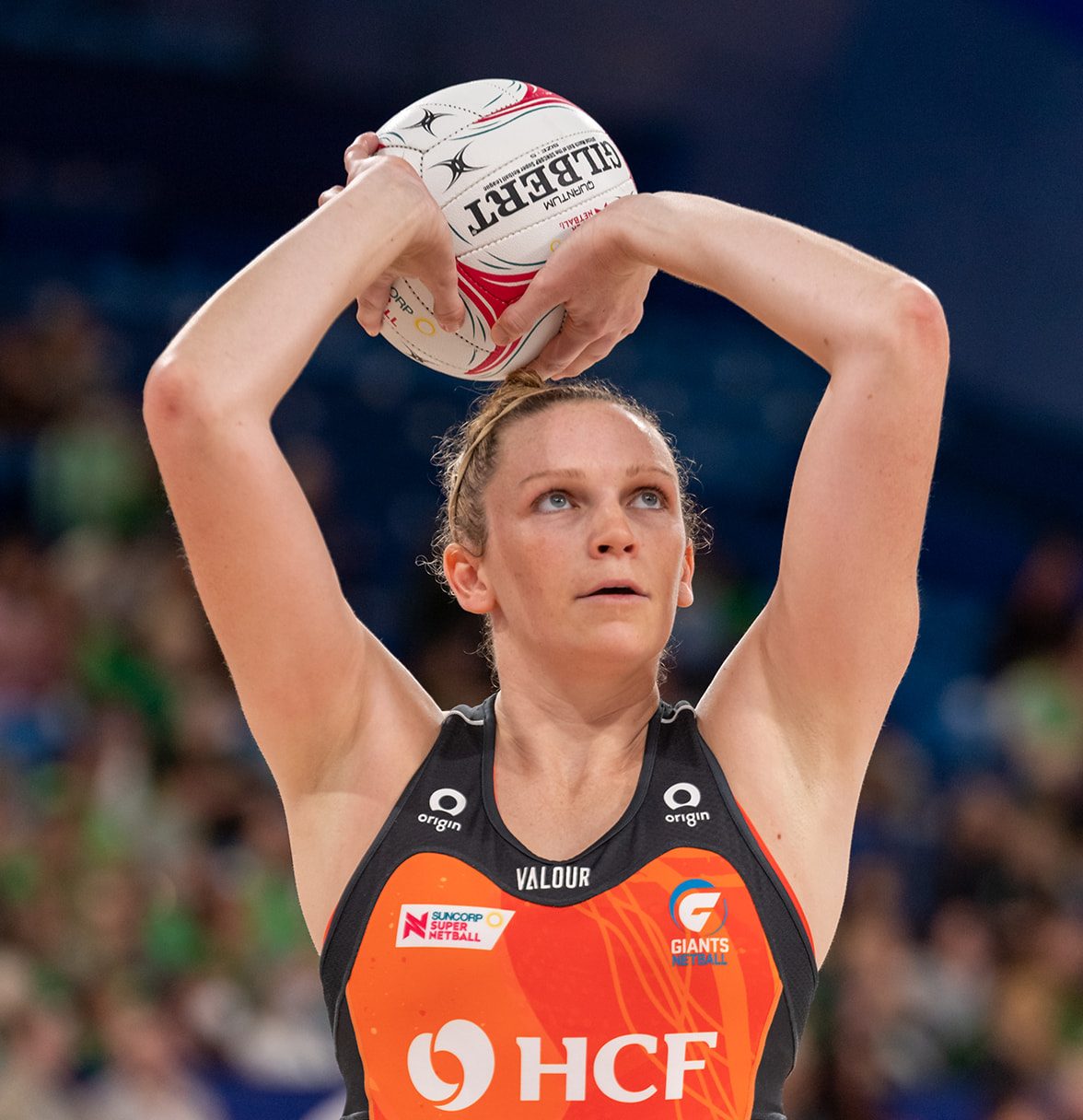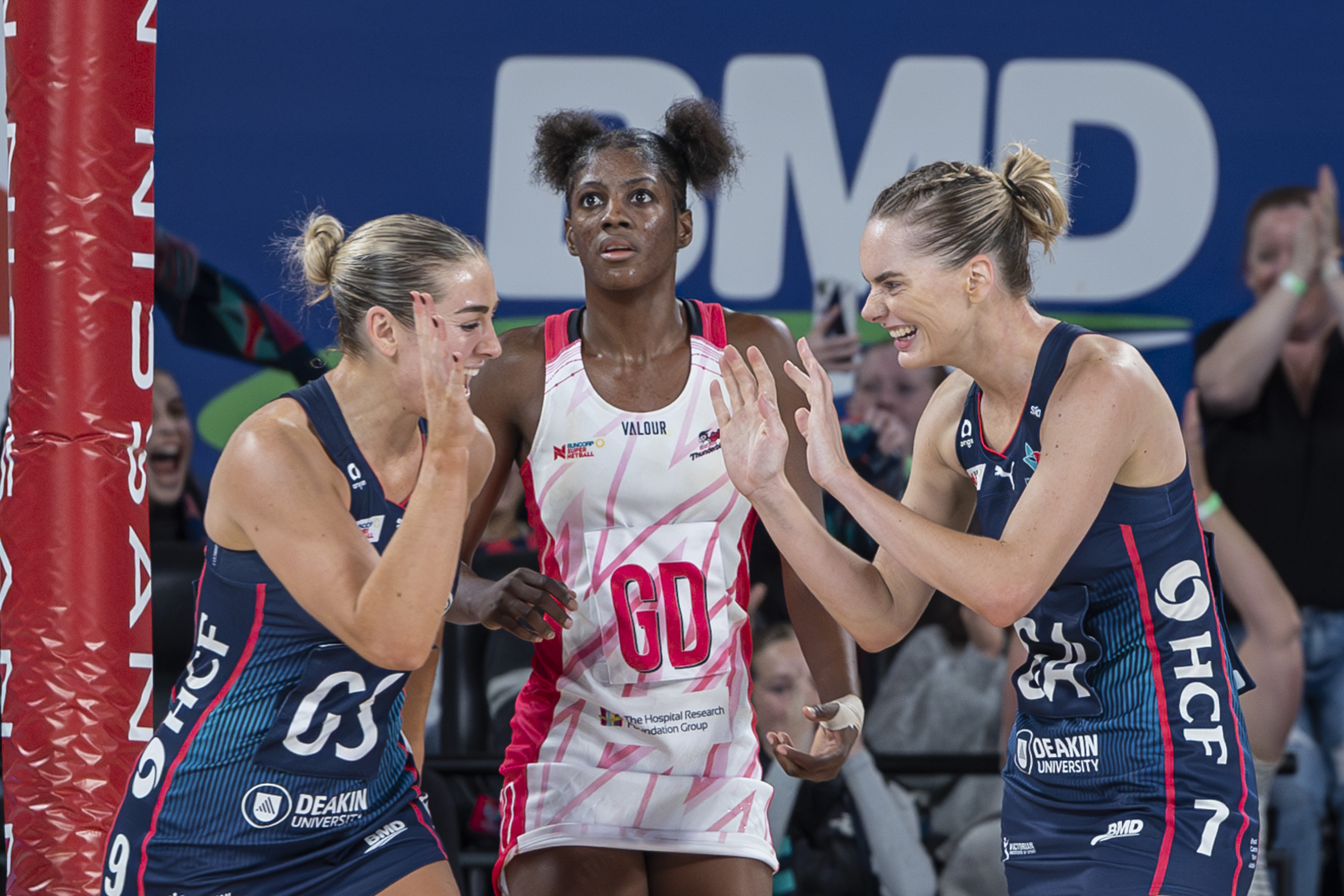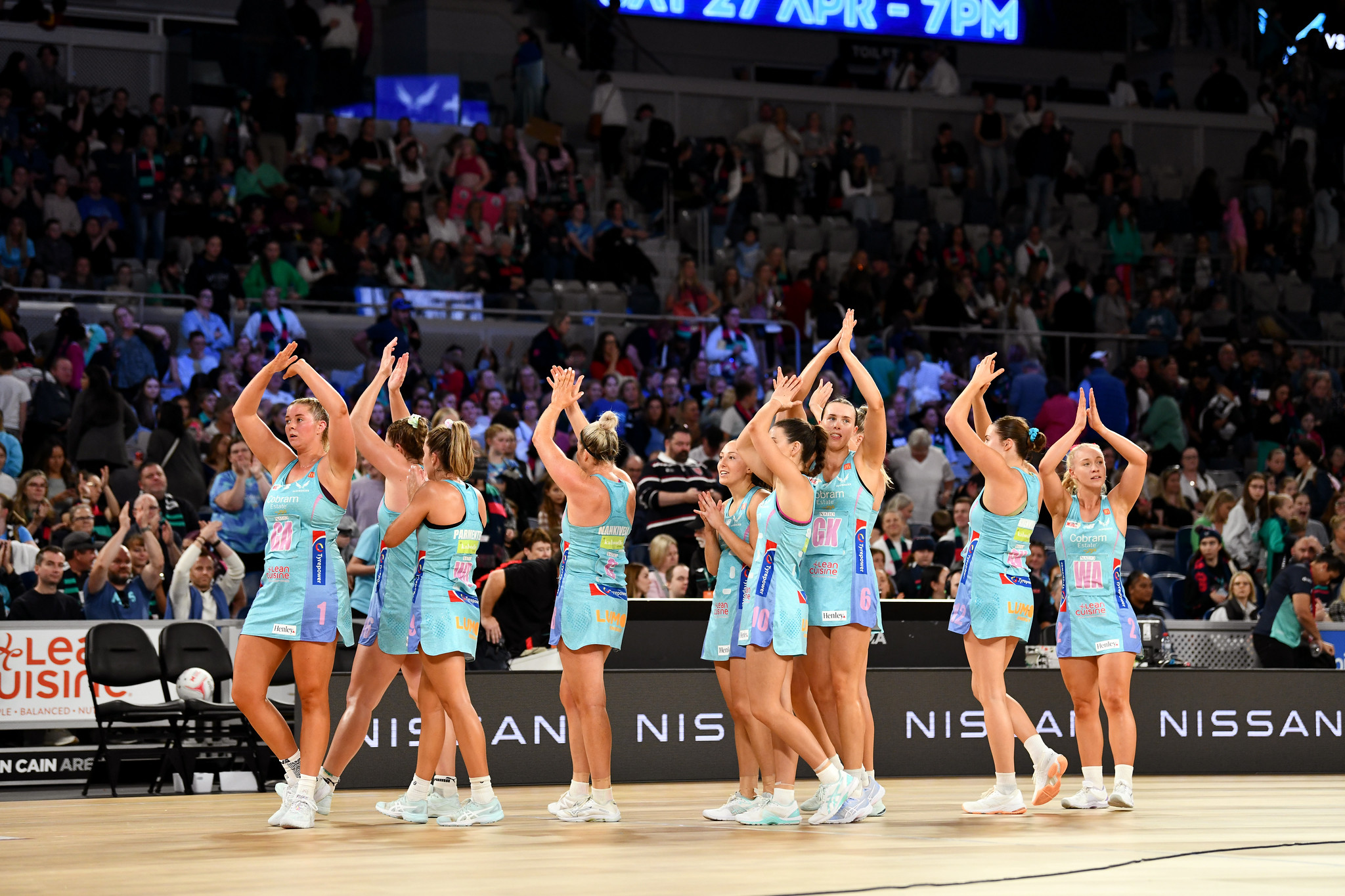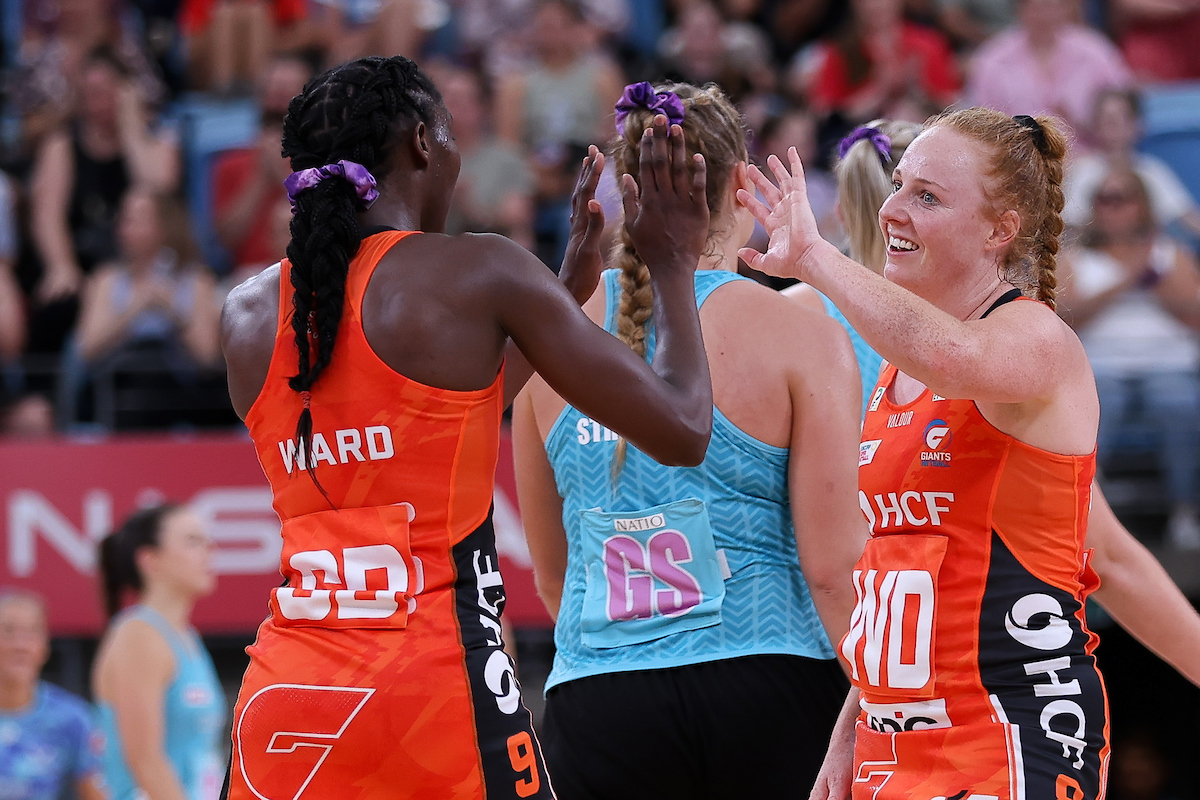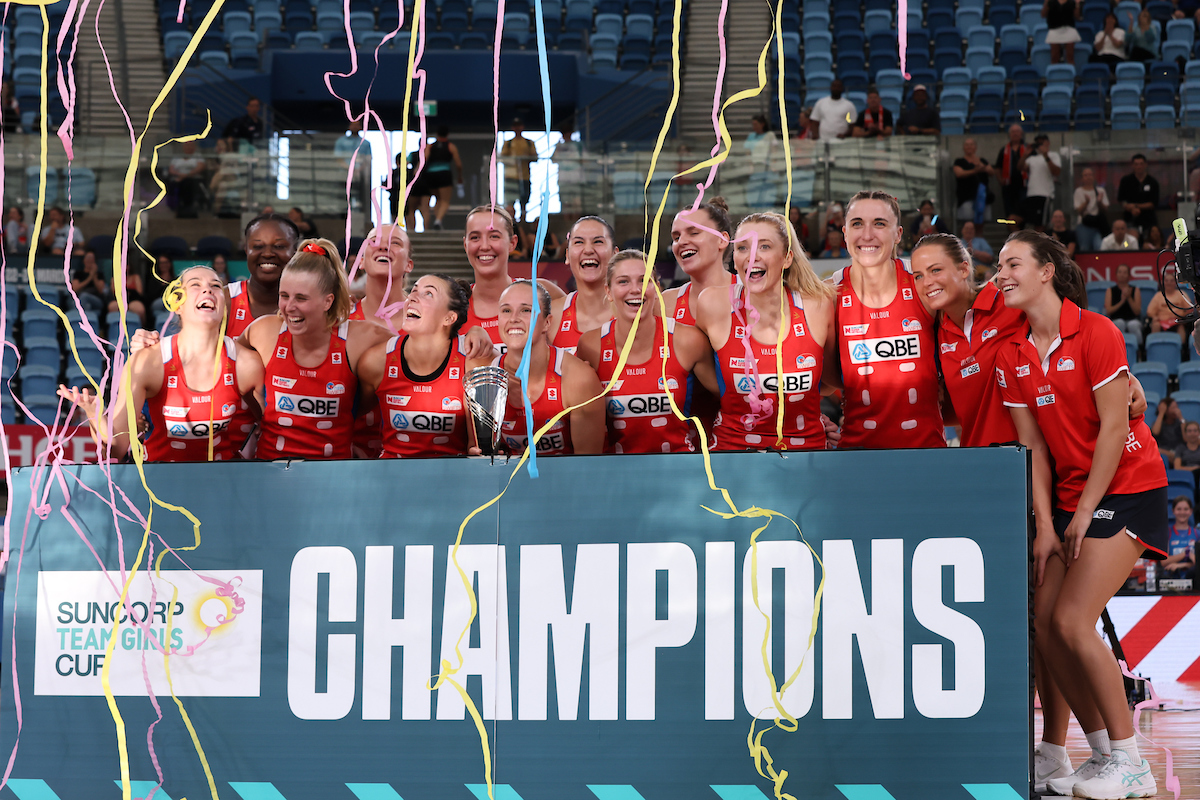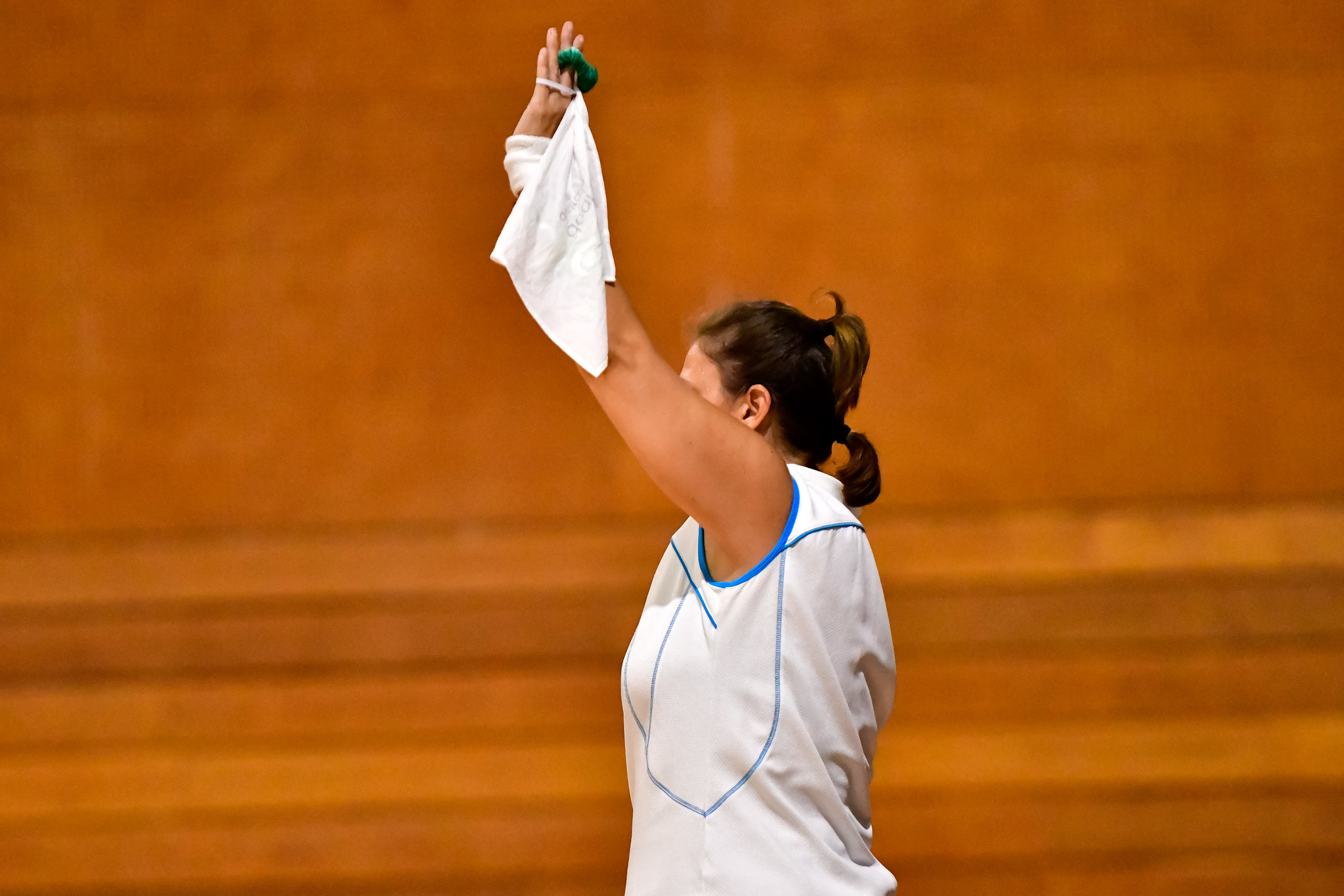Meet Jo Harten.
The netball superstar who’s played club and country for almost 20 years, and been awarded an MBE in the process. Who can shoot from anywhere, and makes the game sing. Someone who builds women up, rather than tearing them down.
But who also said no to national selection three times, before she made her way into the Roses. Describes her 20 year old self as a ‘terrible’ captain, because she was so ‘hot-headed’, and has experienced a range of emotions about her career, from self-doubt and guilt, all the way through to exhilaration and belief.
So how did this unassuming woman become one of netball’s most widely respected athletes and leaders?
It’s perhaps those very human qualities – the uncertainties and emotion – that make her stand out. For in keeping herself real, Harten has become a person that takes people with her, rather than telling them where they should go.
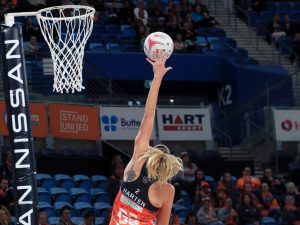
Jo Harten, with the one handed grab. Image Danny Dalton.
The Early Years
Harten was destined to play netball. Desperate to get out on court after watching her mum at local Tuesday night netball, Harten originally bibbed up as a centre, but quickly found her way into the shooting circle. And even from an early age, she had a strong sense of responsibility towards her teammates. “I’d be outside in the pouring rain and freezing snow, shooting goals. If you wear the GS or GA patch that’s your role. So I had an innate hunger to be good at the specific skill of shooting, and I’m proud of my ability now to shoot from anywhere.”
Harten also worked hard on her court craft. She said, “As a youngster, a teenager, my club coaches back in the UK really worked on all parts of my game, because they wanted me to be an all round player, and I’m so grateful for their input.”
But after quickly chatting through her early career – an essential starting point in getting to know an athlete – Harten deviates from the seemingly fairy tale life of a Commonwealth Games gold medallist, sliding below the surface to reveal some of the complexities of being an elite athlete, and the vulnerabilities they might face along the way.
It would be natural, as Harten did, to feel ‘very, very nervous’ about making her debut at the 2007 Netball World Cup, but far less so to share that she’d ever doubted her ability to be there in the first place. “In the 12 months leading up to that point, I’d just broken into the Super League back in the UK, and I’d turned down being the England senior squad three times during that period, because I didn’t think I was ready or could add value to the team,” Harten said.
“I just knew in my mind that I wasn’t strong enough, or had enough experience, but they obviously saw something in me, and kept asking me to put myself forwards. In the end, one of the selectors, Pat Meadows, rang my mum and said I should at least trial and see what it’s all about. In the end I was brave enough and manned up.”
It was the start of a 17 year and counting international career, that has only ever faltered occasionally due to injury.
During her early years with the Mavericks and Loughborough Lightning, Harten set her sights on the ANZC, a domestic league unveiled in 2008, and made up of ten teams across Australia and New Zealand. While building up her resume, the shooter dreamed big, and sent DVDs of her playing skills to a range of teams in the Antipodes.
“I wanted that next step up in my game. I wanted to play against all those amazing athletes and have a taste of that experience. So when my contract came through with (Canterbury) Tactix in 2011, I was over the moon.
“I’d worked really hard on my game, on myself, to be the best player and person I could be.”
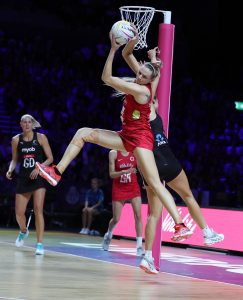
Jo Harten successfully takes on New Zealand defenders, Netball World Cup 2019. Image May Bailey
Growth
The move to New Zealand came, however, with another crisis in confidence. While Harten finds it hard to describe, she said, “As a young English player, you see yourself in a team that’s third or fourth in the world, and then all of a sudden you are being paid to play in the best league in the world, against New Zealand and Australian athletes who are ranked one and two in the world. So you put yourself down in the pecking order.
“I struggled quite a lot with that, and spent quite a bit of time with Tactix’ performance psychologist. It was the pressure of being an import player – the only one allowed in the team. I felt really guilty that I was being paid money to play netball, and Tactix was also struggling at the time as they rebuilt after the Christchurch earthquake, which made it harder.”
After a couple of seasons, Harten headed north to the Waikato Bay of Plenty Magic, still searching for inspiration. Describing the move as one of her career highlights, Harten said, “I had Julie Fitzgerald coaching from the sidelines, a special group in the team, and the leadership of Casey Kopua who was one of the best players in the world.
“I finally found that inner belief and self confidence to grow my game.”
It was during a car ride back from Auckland however, that one of the most significant conversations in Harten’s life happened. “Jules (Fitzgerald) said to me, ‘I think I’m going to go back and start a new team in Australia.
“I was like, ‘Whoa! This is mind blowing. Didn’t see it on the radar.’
“I was so settled in New Zealand – had my residency, really wanted to settle down, and was about to buy my first house. But when Jules said, ‘Would you come?’ I didn’t hesitate. Straight away I said yes, no questions asked, because she’s the best coach I’ve ever played under.
“I have so much respect for how she goes about game day and her tactical knowledge, but also how she approaches athletes as people. She gave me the confidence I’d been searching for throughout my career, so it was an easy decision to make.”
The new team was the Giants, and Harten now calls Sydney home.
Since the move, Harten has elevated her career to new heights. She’s almost reinvented the role of a tall goal shooter – one who can do it all. Hold, move, shoot long or from under the post, direct traffic, set up play, and even shift out to goal attack. Notching up 100 test caps back in 2019, she’s also been awarded an MBE by her country of birth, for services to sport. And while she’s received many accolades along the way, it’s also Harten’s exceptional leadership that sets her apart.
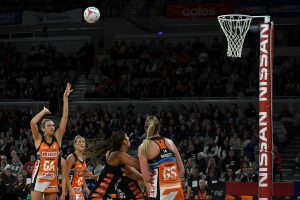
Jo Harten shoots from down town. Her long range accuracy is a strength of Harten’s game. Photo: Alicia Vicars
Leadership
From their beginnings in 2017, Giants were an eclectic group of experience and youth, with Australian Diamond Kimberlee Green named as captain, and Harten as vice-captain. The English import found it exciting, but said, “I didn’t know why I was in that position or what I could do to impact.”
It wasn’t long before she found out. Tragedy struck shortly afterwards, when Green ruptured her ACL, in a season-ending injury. “As well as the human aspect of Kim’s injury, it was like, “Whoa! Everyone’s looking for me to step up now. What do we say in the huddle, how are we going to steer our ship?”
Having captained Loughborough Lightning at just 20 years of age, and describing that younger self as a ‘terrible leader – I was so hot-headed and still finding my feet’, Harten found her sudden elevation to be a nerve-racking experience. “I look back though, and we really leant on each other. We had so much experience in the team, and we all stepped up in different ways to lead. I found that so positive – to be able to ask a Bec Bulley or a Susan Pratley so many questions, and what they thought.
“One of my strengths is that I hope I’m able to listen to people, feel the group, and feel the energy that’s needed, and I think 2017 is a perfect example of learning what we needed to do to continue without Kim.”
To watch Harten on court, is to watch a masterpiece in leadership, whether she holds the title of captain, or not. From her position under the goal post, or the sidelines, she is constantly talking, encouraging and inspiring her teammates. She’s voluntarily handed over her bib near the end of a match, to let retiring athletes such as Susan Pettitt and Rachel Dunn have a special moment out on court in their last games.
And she can wear her heart on her sleeve. Harten said, “I’ve never shied away from showing emotion at the right times, and reeling it in at others. I feel it’s important, especially for the younger players, many of whom have just come into this high stress environment. For me, being vulnerable is about being real, and building a sense of trust.
“Showing people that using emotions both ways can be a strength. For me, sometimes I don’t have a choice in that. All eyes are on you as a leader, and people are looking at your actions. It can be stressful, like performance sport is stressful.
“But being real gets the best out of me on court, and is being true to myself off court.”
From the start, the Giants had wanted to set a good culture in place. They chose to respect their coach, the management, and very importantly, each other. And while that is still the key to how the club operates, Harten also believes that having a range of different individuals in a team is a good dynamic to have. “You might not always get along with everyone in a team, but you do have to communicate and cooperate.
“In any workplace you aren’t going to be best friends with everyone. But it’s about that give and take. First and foremost, you have to put your best foot forward on the court every day. So for each person, each unit, each game day 10 or 12, you need a relationship where you can say anything to anyone, to have that honesty and that trust.
“And if you do falter slightly or move off course, it’s really important that you don’t single out one person or one scenario.
“For me, the easiest way is to bring that back to yourself. Is there a way you can tidy up your own on and off court stuff? It’s about looking inwards first, showing people that you can tidy up your own one percenters, and they will mostly follow suit. Spread across ten people in a team, that’s a ten percent advantage that you might have been lacking.”
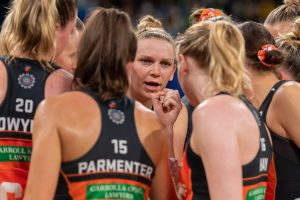
Jo Harten always leads from the front. Image Clinton Bradbury/Bradbury Photography
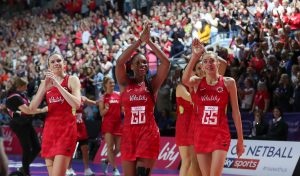
Saying goodbye to the crowd at the 2019 Netball World Cup. Jo Harten took herself off a few minutes before play ended, to allow Rachel Dunn to say farewell from the court. Image May Bailey
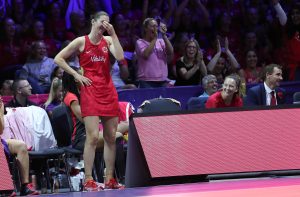
When Jo Harten handed over her bib at the 2019 World Cup to the internationally retiring Rachel Dunn, it sparked a huge reaction from fans, and also for Dunn. She is pictured just before stepping onto court. Image May Bailey
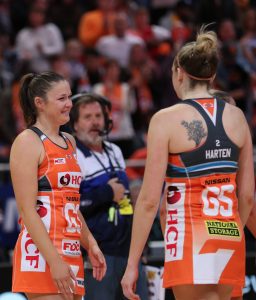
An emotional Susan Pettit acknowledging the gesture from Jo Harten who left the court so Pettit could play a few minutes of her final professional netball match in 2018. Image: May Bailey
On the big stage
Having played domestically across three different countries, Harten is well positioned to talk about the differences between them. For her, it mostly comes down to the levels of professionalism. She said, “Down here, netball is your main source of income, your main priority. You train in the mornings, the afternoons, whereas the Super League in England still isn’t quite at that level. Girls might still be training from 8 to 10 at night, twice a week.
“But the biggest difference between Australia and New Zealand is around game day. The sense of occasion in Australia has got bigger and better over the years, and it’s almost like playing an international match every weekend. The crowds, the media build up, the really intense 60 minutes of netball – it’s all huge.”
Which circles back to the challenges of being an import in an overseas system. While Harten is long past experiencing the guilt of being paid, she finds the pressure on imports is immense. “You play netball all season here, and being a leader at the Giants, I have a lot of responsibility. Then as soon as the season ends, you’re expected to jump on a plane straight back to England and perform, either at camp or at a major tournament. That flight is too much for some people once in a life time, and at one point I was doing it four times a year.
“So it’s a definite stretch, and you have to manage expectations of yourself.
“You can’t be the best version of yourself for 12 months of the year; you need to be kind to yourself and allow time to recoup and recover.
“As we move into this next phase of professionalism for women’s sport, it’s something we need to be better at. Giving athletes adequate space and down time to be able to both deliver for their clubs, who pay their wages and keep them fed and housed, versus playing for their countries where it’s mainly for love and pride, and you don’t really get paid.”
And while gold at the 2018 Commonwealth Games was immense for the English Roses and remains one of Harten’s career highlights, Harten remembers that duality. “It was really draining. Winning a major tournament like that for the first time takes every ounce of energy that you have. At the time I remembered how tired we were, how broken our bodies were.
“We were always told we were 3rd or 4th in the world, so to finally be number one, with the gold medal, was a huge sense of relief because we’d finally been able to be the first English team to do it. I’m pretty proud of that moment.”
Like Jamaica’s recent silver – and oh so close to a gold – medal at the 2022 Commonwealth Games, England’s win has brought about visibility for the sport. “Knowing that we can compete with the best in the world, and also beat the best in the world. As well as an amazing sense of achievement, people in the UK are talking about netball, and wanting to play netball. That was one of the hidden benefits we didn’t see at the time.”
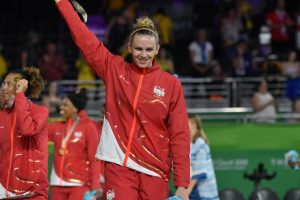
Jo Harten gold medallist – 2018 Commonwealth Games. Image Marcela Massey
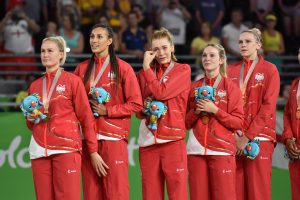
Emotions spill over during the gold medal ceremony at the 2018
Commonwealth Games. Jo Harten far right. Image Marcela Massey
“We should be building each other up”
“Love me or hate me, I compete hard for 60 mins, but no one deserves this.” (From Jo Harten’s Instagram)
In Round 5, 2021, Harten was penalised for a controversial held ball in the dying seconds of a Suncorp Super Netball match. The resulting turnover gave Fever a one goal win, and Harten a merciless trolling. After vile keyboard attacks against her, the goal shooter took a stand, calling out the behaviour on her social media platforms. Wanting to draw attention to an issue that impacts all athletes, but some of the younger ones are perhaps less equipped to handle, it was one of the most powerful and courageous acts of her career, and gained traction and support around the world.
She explained, “I was shocked that a person would use such foul language and abuse towards something I’m so passionate about, and trying my best at. People have access to netball players almost 24/7 now, through Twitter, Facebook, Instagram, TikTok and so on. And there is a responsibility that we all have to safeguard athletes, and particularly the younger players, given the number of platforms they are on.
“Sadly, this kind of abuse is surprisingly common, and when I called it out, it didn’t cross my mind the level of support that the netball community would throw my way. But we need to do more to protect athletes at all levels of the game.”
While athletes are now educated about both the pros and cons of social media, the reality is that they remain a target for attention by fans. Harten rarely touches Twitter these days, and like many athletes, uses an app to block comments on Instagram that contain certain words. She said, “Even if you have a good game, people still don’t think you’ve done well enough. Then there’s fans that comment on your team’s Facebook page, that kind of stuff.
“So there’s almost a fear that you don’t want to be in media articles, or have your name in the spotlight, even if it’s for something amazing, because it draws attention to yourself, and there’s inevitably something nasty.
“Everyone is someone’s daughter, sister, aunty, mum or partner. People need to understand that there’s a human behind the bib, and we all could do a lot better in this space.”
By raising awareness of the issue, Harten hopes that other athletes will learn from her experience, but also wants to encourage people to think before they type. “What if that comment was aimed at you, or even worse, at your daughter? We have a responsibility to realise there is a wide audience reading and digesting what people have written.
“Instead of being negative, we should be building each other up.
“Netball is a sport that’s so much fun, for all the family. It’s predominantly played by women in this country.
“So let’s build up these women. They’re strong, powerful role models that we can make even better, and then the next generation will aspire to be better, and over time we develop this generation cyclical progress.”
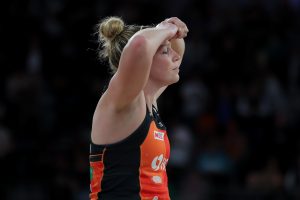
Heart break for Giants captain Jo Harten. The captain isn’t afraid to be real. Image: May Bailey | Giants Netball
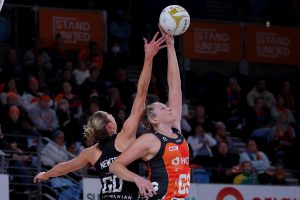
Harten pulls in a high ball. Image May Bailey
The Knee
Injury has made life difficult for Harten over the past eight months. Already sporting the regular wear and tear of any athlete that gives 100% to their sport, she sustained a knee injury at national camp just a week before the 2022 Commonwealth Games. Based on medical advice at the time, she was cleared to compete, only to damage the joint further. She said, “I’ve been rehabbing it ever since, got to a good place, but in January played one game in Manchester and it flared up again.
Selected into the 2023 Quad Series despite the issue, Harten was unable to take the court. She and the Giants management made the decision that she’d leave South Africa early for further medical treatment. “I needed surgery, a clean up of my meniscus and cartilage, and to reset on strength work to give myself the best possible chance of having an injury free season and to play to my full potential this year.
“I’m five weeks post surgery now and back on court running, building up capacity for changes of direction, and things are looking pretty good.”
If the saga took Harten into the darkness, she’s back on track now. “It’s been pretty rough,” she said. “I’d wake up in the morning, how’s my knee feeling, can I train today, can I push myself to the limit?
“As an athlete for the past 15 years, I’ve been used to flogging my body at every training session, and pushing myself to the max. Not being able to do that with my injury has been frustrating.
“I have had some dark times. Netball is my passion, my job, and not being able to perform for my club or my country has been difficult. I’m hoping that by putting in a lot of hard work by myself, I can get out on court with my team, and I can experience the good times again.”
And while Harten is highly self-motivated and independent, she also takes strength from others. “It does help when you have 12 teammates cheering you on when you do your first run, or hit a milestone in the gym. My Giants’ girls have been super supportive, and I can see them on the next court doing the thing I love, so that’s where I get my inspiration from most days.”
Given her enormous capacity for leadership, it’s little surprise that Harten is being touted as a future elite coach. It’s a career that tempts her, but also brings about a wry smile. “People keep telling me that – I think I’ve been injured for too long.
“I’ve always thought it’s something I’d like to do – I have some wacky ideas I try out on some of the younger players but I’m also very disciplined when it comes to netball – but I’ll only focus on playing for the next few years.”
All of which is good news for fans. To not only watch and marvel at Harten’s skills, but everything else that she brings to the game.
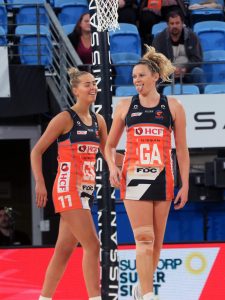
Harten encouraging debutante Matisse Letherbarrow, her troublesome right knee heavily strapped. Image Danny Dalton.
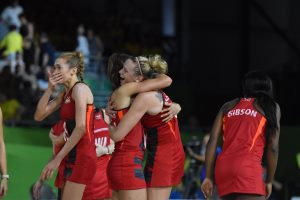
Gold medal success. Harten has been part of England’s successful H2 combination for many years – sharing the shooting circle with Helen Housby (front). Image Marcela Massey
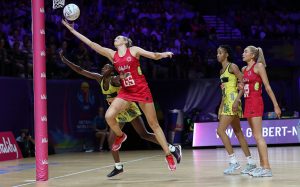
Finger tip control against Jamaica, 2019 Netball World Cup. Image May Bailey
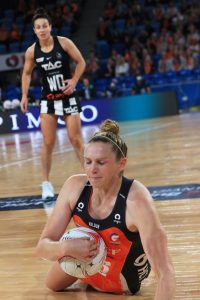
Jo Harten was hungry for the ball in this Giants game, scoring 50/50. Image Danny Dalton
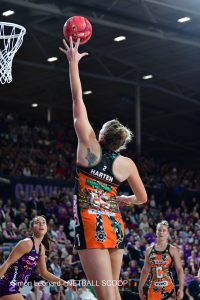
Jo Harten is known for her Inspector Gadget arms. Image Simon Leonard.
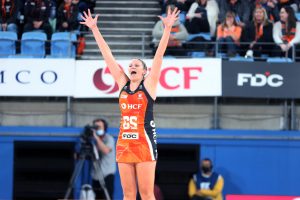
Harten cheers her side during the 2022 Minor semi-final against Magpies. Image: Danny Dalton

